
Welcome to the official NeoGAF thread for Chess players, Chess enthusiasts and everyone who is interested in the sport and art of Chess!

The earliest predecessor to the game we recognise as Chess today is Chaturanga, a board game that originated in India during the Gupta Empire (320-550 CE). Its ruleset shared many themes with the modern game, most importantly the role of the King as the crucial piece everything else revolves around. The piece movement was partially the same while the actual pieces had slightly different denotations (the most famous one being the Elephant which we now know as Bishop).
The game of Chaturanga inspired chess-like games across countless Asian countries, reaching Persia and, ultimately, Arabia where it evolved into Shatranj. It was this form of Chess that eventually made it over to Europe with Spain and England being early adopters of the game. At the end of the 15th century, the ruleset reached a state which can be considered close to final. The game did not undergo many signifcant changes from that point on.
It was also at this time that early analysis of the game emerged, primarily out of Southern Europe (Spain, Italy, Portugal). Important theoreticians include Luis Ramirez de Lucena, Pedro Damiano, Ruy López de Segura, Gioachino Greco and Guilio Cesare Polerio; names every chess player has heard in some context or another, whether it is in nomenclature of the opening or endgame.
The centre of Chess slowly shifted toward Central and Northern Europe, with France, Germany and England taking strong interest in the game. Chess became ubiquitous in the 18th and 19th century with the increased output in Chess literature and analysis, organising of correspondence matches and tournaments, the founding of Chess clubs and the publication of Chess problems in newspapers.
The first Chess tournament was organised by Howard Staunton in 1851, arguably heralding the modern era of Chess. The first officially recognised World Championship match occured in 1886 and was won by Wilhelm Steinitz. The Chess world has seen fifteen successors, as well as the founding of the Fédération Internationale des Échecs (FIDE) in 1924, since then.
World Chess Champions:
1. Wilhelm Steinitz (1886-1894)
2. Emanuel Lasker (1894-1921)
3. José Raúl Capablanca (1921-1927)
4. Alexander Aljechin (1927-1935, 1937-1946)
5. Max Euwe (1935-1937)
6. Mikhail Botvinnik (1948-1957, 1958-1960, 1961-1963)
7. Vasily Smyslov (1957-1958)
8. Mikhail Tal (1960-1961)
9. Tigran Petrosian (1963-1969)
10. Boris Spassky (1969-1972)
11. Bobby Fischer (1972-1975)
12. Anatoly Karpov (1975-1985)
13. Garry Kasparov (1985-2000)
14. Vladimir Kramnik (2000-2007)
15. Viswanathan Anand (2007-2013)
16. Magnus Carlsen (2013-present)

Coming soon!

With so many Chess sites out there, what follows is a selection of recommended training and news sites from yours truly.
Chessgames.com - Largest online database with a Game replayer. Lots of neat features like Game of the Day, Tactics Training, Guess-The-Move, Comment Sections, etc. Ongoing tournaments (the big ones, anyway) also rapidly get archived and discussed.
ChessBomb - Best site for live broadcasts of ongoing tournaments.
ChessPub - Most respected forum for discussion of opening theory. Several masters post on this board.
Chessvideos.tv - Extremely useful sites for a lot of things. Tons of free training videos, live blitz, etc. from masters and non-masters, an interactive Endgame trainer, a Diagram Generator and other stuff.
Live Chess Ratings - Top rating lists for Men and Women as well as Classic, Rapid and Blitz that are always up to date. Keep in mind that the FIDE only updates ratings on a monthly basis so if one player participated in a bunch of tournaments in one month, their official rating may not reflect recent developments.
The Week in Chess - The most important Chess magazine featuring articles from the world elite. Features a download section with database updates for recent tournaments, allowing you to update your Chess database without buying into Chessbase products.
Chessvibes - Probably the best Chess news site out there.
Chessbase - Definitely the most popular Chess news site out there.
Chesstempo - Free tactics training with a huge database plus some other neat training tools.
Herderschach - German only. Great selection of varied training material.
Chess Notes by Edward Winter - Insanely rich archive of Chess memorabilia and Chess-related finds of historical significance. Over 9000 entries at the moment, perfect for browsing, indispensable for research.
Chess Café - Articles, columns and other interesting features on Chess.
Chess Club and Scholastic Center of Saint Louis YT channel - Saint Louis is the center of US Chess at the moment. The Chess School uploads every one of their lectures to YT, offering instructive material for all levels of (amateur) players. Hot tip: Ben Finegold's lectures are the best.
Greg Shahade's YT channel - Tons of instructional and/or entertaining Chess content by IM Greg Shahade.
Chess 24 - Analysis and Live Blitz in English and German featuring strong players, including popular commentators like Jan Gustafsson and Lawrence Trent.

A very personal and very tiny selection of books on general strategy, openings, endgames, etc. If you have questions about specific books or authors (mentioned or not mentioned here), feel free to ask in the thread. I will expand the list over time but it can obviously never be complete.
Aaron Nimzowitch - My System and Praxis of My System - Classic books on strategy as conceived by Tarrasch's biggest adversary. A lot of revolutionary ideas especially concering the concept of pawn structure and blockade. Still relevant today, and of significant historical interest.
Bobby Fischer - My 60 Memorable Games - One of the greatest players of all-time analyses and reminisces about his games and life in chess.
Mark Dvoretsky - Dvoretsky's Endgame Manual - Endgame Bible would be a more accurate title. A comprehensive book for beginner and super GM alike.
Garry Kasparov - My Great Predecessors 1-5 - Kasparov analyses games of former World Champions and the ones that were good enough (but also unlucky enough) to miss out on the title. Groundbreaking analysis at the time.
David Bronstein - Zurich International Chess Tournament, 1953 - The granddaddy of fantastic tournament books. Bronstein (speaking of unofficial World Champions) analyses every game that was played in one of the strongest tournaments of all-time (and that he participated), featuring virtually every player from the era's elite.
Rudolf Spielmann - The Art of Sacrifice - A book on attacking chess by one of the greatest attacking players in history.
Mikhail Tal - The Life and Games of Mikhail Tal - See above. The 'magician' himself commentates on his career. Must-read.
Alexei Shirov - Fire On Board 1 & 2 - Concluding the small block of books on attacking chess, these modern classics by the Tal of the '90s and oughts are pure bliss.
Bent Larsen - Bent Larsen's Best Games: Fighting Chess with the Great Dane - One of the greatest players that never got the crown commentates on his life in chess, giving a very personal account of his career and simultaneously illuminating an entire era of chess. An absolutely marvelous book by a wonderfully creative player, finally available in its complete form.
Ray Cheng - Practical Chess Exercises - An assortment of exercises ranging from tactics to strategy with emphasis on practical usability. A great book for newcomers to the game and advanced players alike.
Andrei Volokitin - Perfect Your Chess - A modern classic for Chess exercises. The counterpart to Cheng as this is only to be recommended for players of an advanced level and upwards, all the way to GM even. It shares the practical focus, however, offering three different types of exercises: 'Find the best move', Find the winning move' as well as 'Questions & Answers' wherein you have to deal with specific inquiries pertinent to the position.

A heavily curated list featuring the most respected Online Chess sites that I can safely recommend. Your mileage may vary, of course, and with the hundreds of Online Chess sites out there, you will probably find the right one to suit your tastes.
Chess.com - Online and Correspondence Chess
Internet Chess Club - Requires paid subscription. Most respectable site for Live Chess with the highest contingent of masters.
Chesscube - Uses fake currency system. Possibly the best site for bullet. Fast-paced Warzone tournaments.
Free Internet Chess Server - Requires desktop client. Supports variants like bughouse, tournaments, etc.
Lichess.org - Relatively new. Offers some interesting variants and the site is still in flux, adapting to user feedback.


(26-06-15) Topalov emerges victorious out of the immensely strong Super-GM tournament in Norway wth 6.5/9. In second place, Nakamura and Anand with 6 points each. On the other end of the spectrum, the World Champion had a desastrous performance, with only 3.5 points after a 0.5/4 start.
Game of the tournament: Anand - Carlsen 1-0
(26-04-15) The first Gashimov Memorial was won by Carlsen with 7 points followed by Anand with 6 points. The tournament offered plenty of interesting chess with a lot of decisive results.
Game of the tournament: Anand - So 1-0
(27-02-15) The new FIDE cycle is in full swing, with the first Grand Prix tourney of the new season in Tbilisi already at an end. The winner is Tomashevsky with a full 1.5 point lead followed by Jakovenko with 6 points.
Game of the tournament: Radjabov - Grischuk 1-0
(19-02-15) Nakamura wins the Zürich Chess Challenge on overall points (Classical, Rapid, Blitz)
Game of the tournament: Anand - Aronian 1-0
(09-02-15) Carlsen wins the GRENKE Chess Classic after beating Naiditisch (both 4.5/7) in the Armaggedon games.
Game of the tournament: Naiditsch - Carlsen 1-0
(25-01-15) Carlsen wins the 77th edition of the tournament in Wijk an Zee with 9/13, followed by four players with 8.5/13!
(10-01-15) The first round of the 77th Tata Steel Chess Tournament in Wijk aan Zee started today. This tournament is one of the oldest Super GM tournaments that's still going strong every year. The participants in the Masters category include Magnus Carlsen, Fabiano Caruana, Levon Aronian, Yifan Hou, Vassily Ivanchuk, Anish Giri, et al.
Game of round 1: Vachier-Lagrave - Hou 1-0
Game of round 2: Caruana - Saric 1-0
Game of round 3: Ivanchuk - van Wely 1-0
Game of round 4: Radjabov - Liren 0-1
Game of round 5: Wojtaszek - Caruana 1-0
Game of round 6: Caruana - Carlsen 0-1
Game of round 7: Saric - Jobava 0-1
Game of round 8: Ivanchuk - So 0-1
Game of round 9: Caruana - Hou 1/2-1/2
Game of round 10: van Wely - Hou 1-0
Game of round 11: Giri - So 1-0
Game of round 12: Aronian - Liren 0-1
Homepage - Participants - Live Games & Commentary (click on one of the game tabs!) - Commentary schedule - En passant Interviews

Beginner Level - White to move
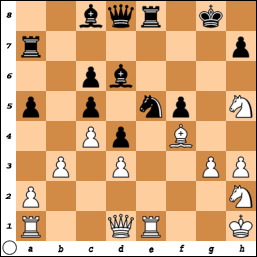
Intermediate Level - Black to move
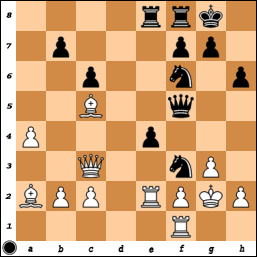
Advanced Level - White to move
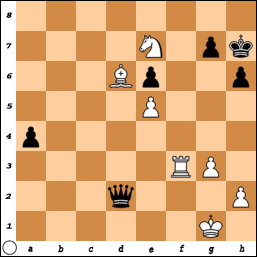
Archive: B1; I1; A1; B2; I2; A2

Beginner Level - Elementary Endgames I
a) Mate with K+Q vs. K
b) Mate with K+2R vs. K
c) Mate with K+R vs. K
The second thing every student learns after being introduced to the rules of the game is mating with the major pieces.
a) For King and Queen, I linked to the CVTV trainer. Try and figure out how to do it on your own first. You can always ask questions in the thread if you get stuck. The most important thing to keep in mind is that you can never mate with one piece alone. Never. Since you only have two left, you'll have to activate both King and Queen to finish the job.
b) For two Rooks, I linked to a text tutorial on how to do the so-called 'stepladder method'. This is the easiest mate to accomplish so you shouldn't have any difficulties. You're slowly forcing the king to the back rank by taking away subsequent rows. By having the rooks on open lines, you'll avoid having your Rooks stepping on each others' toes.
c) For King and one Rook, I linked to a video explaining the process. The mating pattern also serves as an introduction to the crucial concept of Opposition. Be sure to put your newfound knowledge to the test.
Intermediate Level - Opening I
The Scotch Four Knights Game is a great weapon for beginners looking to lay the foundation for a feasible White repertoire without resorting to formulaic setups 'against everything' like the KIA (King's Indian Attack). The opening arises after:
1. e4 e5 2. Nf3 Nc6 3. Nc3 Nf6 4. d4
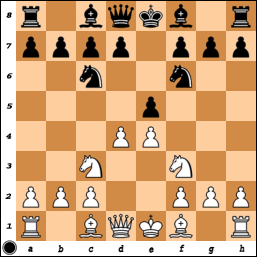
The main line (keep in mind there are several interesting and/or bad deviations at every turn) continues 4..exd4 5. Nxd4 Bb4 By far the most logical move, putting pressure on e4 by way of the pin and preparing castling.
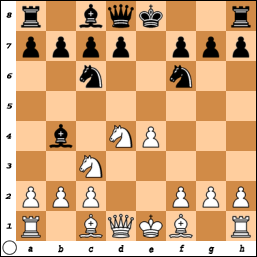
6. Nxc6 bxc6 7. Bd3 d5 Everything else would be too passive for Black.
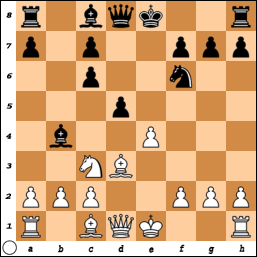
8. exd5 cxd5 9. 0-0 0-0 10. Bg5 c6 Black defends against the threat of Bxf6 and Nxd5.
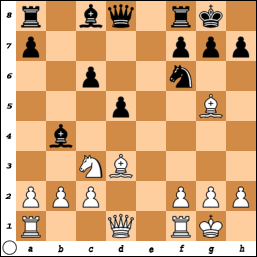
This is where the main line splits. Several moves have been tried here for White, the most important choices being 11. Qf3, 11. Ne2 and 11. Na4. Let's talk a bit about the characteristics of the position. White has achieved a playable middlegame position with maybe the slightest of advantages. While Black would not have any problems holding the balance in this position on higher levels, on lower levels it will be infinitely advantageous to be comfortable with the position and be familiar with the White plans going forward. White possesses the better pawn structure (two vs. three pawn islands) while Black has a better central presence to show for it. White's bishops are slightly more active at the moment and Black will have to deal with the pin on the Nf6 sooner or later. As the branching paths here indicate, White can go for several plans in this position, not the least of which including an undermining of the centre with c4, either splitting up the centre leaving behind a weak c6-pawn, d5-pawn or separating the two pawns in case the Black pawn advances to d4.
Sample games: Rublevsky-Novik, 1990; Lautier-Moreno, 1992; Rowe-Roggensack, 2014; Morozevich-Karjakin, 2014
Bibliography (Kenilworthian)
Advanced Level
Coming Soon!
-----------------------------------------------
That's all for now, folks! Please don't hesitate to ask any question, at all, that you might have. We can talk openly about everything Chess-related in here so let's do just that. Needless to say, suggestions for any part of the OP, whether brought up in the thread or via PM, are welcome (encouraged, in fact!). Some sections are incomplete right now but I really wanted to gauge interest, average player level and all that first. The OP is supposed to be reflective of ChessGAF's desiderata, after all. Lastly, don't forget that the thread can serve as a place to find an opponent for a friendly GAF match.
Huge thanks to kubus for designing the awesome headers!



